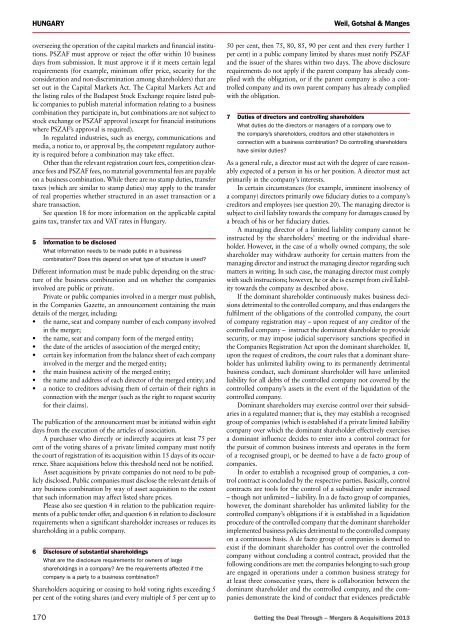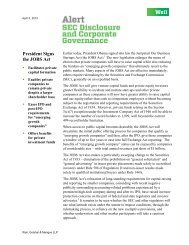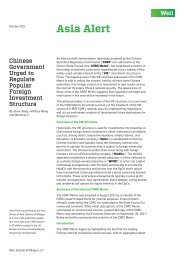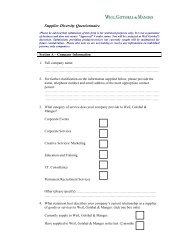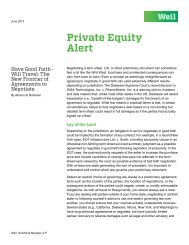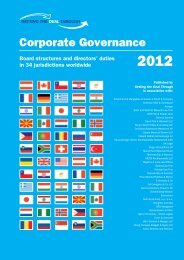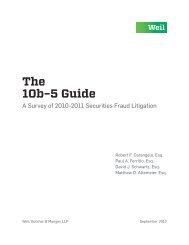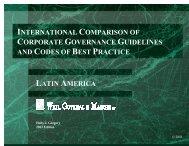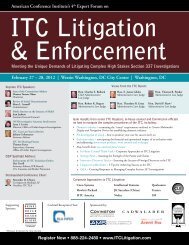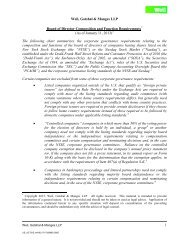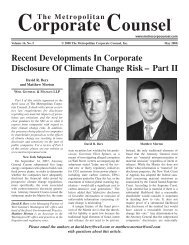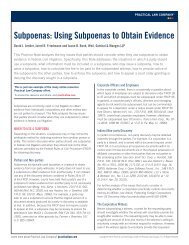here - Weil, Gotshal & Manges
here - Weil, Gotshal & Manges
here - Weil, Gotshal & Manges
You also want an ePaper? Increase the reach of your titles
YUMPU automatically turns print PDFs into web optimized ePapers that Google loves.
Hungary<br />
<strong>Weil</strong>, <strong>Gotshal</strong> & <strong>Manges</strong><br />
overseeing the operation of the capital markets and financial institutions.<br />
PSZAF must approve or reject the offer within 10 business<br />
days from submission. It must approve it if it meets certain legal<br />
requirements (for example, minimum offer price, security for the<br />
consideration and non-discrimination among shareholders) that are<br />
set out in the Capital Markets Act. The Capital Markets Act and<br />
the listing rules of the Budapest Stock Exchange require listed public<br />
companies to publish material information relating to a business<br />
combination they participate in, but combinations are not subject to<br />
stock exchange or PSZAF approval (except for financial institutions<br />
w<strong>here</strong> PSZAF’s approval is required).<br />
In regulated industries, such as energy, communications and<br />
media, a notice to, or approval by, the competent regulatory authority<br />
is required before a combination may take effect.<br />
Other than the relevant registration court fees, competition clearance<br />
fees and PSZAF fees, no material governmental fees are payable<br />
on a business combination. While t<strong>here</strong> are no stamp duties, transfer<br />
taxes (which are similar to stamp duties) may apply to the transfer<br />
of real properties whether structured in an asset transaction or a<br />
share transaction.<br />
See question 18 for more information on the applicable capital<br />
gains tax, transfer tax and VAT rates in Hungary.<br />
5 Information to be disclosed<br />
What information needs to be made public in a business<br />
combination? Does this depend on what type of structure is used?<br />
Different information must be made public depending on the structure<br />
of the business combination and on whether the companies<br />
involved are public or private.<br />
Private or public companies involved in a merger must publish,<br />
in the Companies Gazette, an announcement containing the main<br />
details of the merger, including:<br />
• the name, seat and company number of each company involved<br />
in the merger;<br />
• the name, seat and company form of the merged entity;<br />
• the date of the articles of association of the merged entity;<br />
• certain key information from the balance sheet of each company<br />
involved in the merger and the merged entity;<br />
• the main business activity of the merged entity;<br />
• the name and address of each director of the merged entity; and<br />
• a notice to creditors advising them of certain of their rights in<br />
connection with the merger (such as the right to request security<br />
for their claims).<br />
The publication of the announcement must be initiated within eight<br />
days from the execution of the articles of association.<br />
A purchaser who directly or indirectly acquires at least 75 per<br />
cent of the voting shares of a private limited company must notify<br />
the court of registration of its acquisition within 15 days of its occurrence.<br />
Share acquisitions below this threshold need not be notified.<br />
Asset acquisitions by private companies do not need to be publicly<br />
disclosed. Public companies must disclose the relevant details of<br />
any business combination by way of asset acquisition to the extent<br />
that such information may affect listed share prices.<br />
Please also see question 4 in relation to the publication requirements<br />
of a public tender offer, and question 6 in relation to disclosure<br />
requirements when a significant shareholder increases or reduces its<br />
shareholding in a public company.<br />
6 Disclosure of substantial shareholdings<br />
What are the disclosure requirements for owners of large<br />
shareholdings in a company? Are the requirements affected if the<br />
company is a party to a business combination?<br />
Shareholders acquiring or ceasing to hold voting rights exceeding 5<br />
per cent of the voting shares (and every multiple of 5 per cent up to<br />
50 per cent, then 75, 80, 85, 90 per cent and then every further 1<br />
per cent) in a public company limited by shares must notify PSZAF<br />
and the issuer of the shares within two days. The above disclosure<br />
requirements do not apply if the parent company has already complied<br />
with the obligation, or if the parent company is also a controlled<br />
company and its own parent company has already complied<br />
with the obligation.<br />
7 Duties of directors and controlling shareholders<br />
What duties do the directors or managers of a company owe to<br />
the company’s shareholders, creditors and other stakeholders in<br />
connection with a business combination? Do controlling shareholders<br />
have similar duties?<br />
As a general rule, a director must act with the degree of care reasonably<br />
expected of a person in his or her position. A director must act<br />
primarily in the company’s interests.<br />
In certain circumstances (for example, imminent insolvency of<br />
a company) directors primarily owe fiduciary duties to a company’s<br />
creditors and employees (see question 20). The managing director is<br />
subject to civil liability towards the company for damages caused by<br />
a breach of his or her fiduciary duties.<br />
A managing director of a limited liability company cannot be<br />
instructed by the shareholders’ meeting or the individual shareholder.<br />
However, in the case of a wholly owned company, the sole<br />
shareholder may withdraw authority for certain matters from the<br />
managing director and instruct the managing director regarding such<br />
matters in writing. In such case, the managing director must comply<br />
with such instructions; however, he or she is exempt from civil liability<br />
towards the company as described above.<br />
If the dominant shareholder continuously makes business decisions<br />
detrimental to the controlled company, and thus endangers the<br />
fulfilment of the obligations of the controlled company, the court<br />
of company registration may – upon request of any creditor of the<br />
controlled company – instruct the dominant shareholder to provide<br />
security, or may impose judicial supervisory sanctions specified in<br />
the Companies Registration Act upon the dominant shareholder. If,<br />
upon the request of creditors, the court rules that a dominant shareholder<br />
has unlimited liability owing to its permanently detrimental<br />
business conduct, such dominant shareholder will have unlimited<br />
liability for all debts of the controlled company not covered by the<br />
controlled company’s assets in the event of the liquidation of the<br />
controlled company.<br />
Dominant shareholders may exercise control over their subsidiaries<br />
in a regulated manner; that is, they may establish a recognised<br />
group of companies (which is established if a private limited liability<br />
company over which the dominant shareholder effectively exercises<br />
a dominant influence decides to enter into a control contract for<br />
the pursuit of common business interests and operates in the form<br />
of a recognised group), or be deemed to have a de facto group of<br />
companies.<br />
In order to establish a recognised group of companies, a control<br />
contract is concluded by the respective parties. Basically, control<br />
contracts are tools for the control of a subsidiary under increased<br />
– though not unlimited – liability. In a de facto group of companies,<br />
however, the dominant shareholder has unlimited liability for the<br />
controlled company’s obligations if it is established in a liquidation<br />
procedure of the controlled company that the dominant shareholder<br />
implemented business policies detrimental to the controlled company<br />
on a continuous basis. A de facto group of companies is deemed to<br />
exist if the dominant shareholder has control over the controlled<br />
company without concluding a control contract, provided that the<br />
following conditions are met: the companies belonging to such group<br />
are engaged in operations under a common business strategy for<br />
at least three consecutive years, t<strong>here</strong> is collaboration between the<br />
dominant shareholder and the controlled company, and the companies<br />
demonstrate the kind of conduct that evidences predictable<br />
170 Getting the Deal Through – Mergers & Acquisitions 2013


